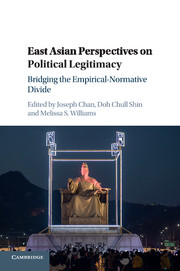Book contents
- Frontmatter
- Contents
- List of Contributors
- Preface and Acknowledgments
- 1 Political Legitimacy in East Asia: Bridging Normative and Empirical Analysis
- 2 Reasons to Obey: “Multiple Modernities” and Constructions of Political Legitimacy
- 3 Do East Asian States Enjoy a Legitimacy Premium?
- 4 Political Legitimacy in China: A Confucian Approach
- 5 Political Legitimacy in Hong Kong: A Hybrid Notion
- 6 The Evolution of Political Legitimacy in Singapore: Electoral Institutions, Governmental Performance, Moral Authority, and Meritocracy
- 7 Polarized Politics, Government Legitimacy, and Democratic Legitimacy in Taiwan
- 8 The Legitimacy of Democratic Rule in Korea: From the Perspective of the Mass Citizenry
- 9 Political Legitimacy, Satisfaction, and Japanese Democracy
- 10 Legitimacy as a Hybrid Phenomenon
- Index
8 - The Legitimacy of Democratic Rule in Korea: From the Perspective of the Mass Citizenry
Published online by Cambridge University Press: 30 December 2016
- Frontmatter
- Contents
- List of Contributors
- Preface and Acknowledgments
- 1 Political Legitimacy in East Asia: Bridging Normative and Empirical Analysis
- 2 Reasons to Obey: “Multiple Modernities” and Constructions of Political Legitimacy
- 3 Do East Asian States Enjoy a Legitimacy Premium?
- 4 Political Legitimacy in China: A Confucian Approach
- 5 Political Legitimacy in Hong Kong: A Hybrid Notion
- 6 The Evolution of Political Legitimacy in Singapore: Electoral Institutions, Governmental Performance, Moral Authority, and Meritocracy
- 7 Polarized Politics, Government Legitimacy, and Democratic Legitimacy in Taiwan
- 8 The Legitimacy of Democratic Rule in Korea: From the Perspective of the Mass Citizenry
- 9 Political Legitimacy, Satisfaction, and Japanese Democracy
- 10 Legitimacy as a Hybrid Phenomenon
- Index
Summary
Scholars and political analysts agree that mass political orientations are crucial to the democratic transformation of authoritarian political systems and the consolidation of nascent democratic systems. On the institutional level, a political system becomes democratic with the adoption of a democratic constitution, competitive elections, and multiple political parties. However, these institutions alone do not make for a well-functioning representative democracy. Nor do they produce a fully liberal democracy.
As Richard Rose and his associates aptly point out, the institutions constitute nothing more than “the hardware” of representative democracy. To operate properly, a democratic political system requires “software” congruent with the various hardware components. Citizen attitudes to democracy and their reactions to its institutions are key components of the software required for democracy to work.
All democracies, both new and old, can perform effectively and thrive long term only with support from a majority of their respective citizenries. More notably, new electoral democracies become fully consolidated liberal democracies only when an overwhelming majority of the mass citizenry embraces democratic rule as “the only game in town.” For this reason, how ordinary citizens view democracy and react to its institutions and processes has recently become a central concern in research and theory on the legitimatization of democratic rule especially in third wave democracies.
This chapter seeks to examine how much progress has been made in building a democratic political culture that is fully compatible with the institutions of representative democracy in South Korea (Korea hereafter), one of five third wave democracies in East Asia. To this end, we first propose a new multidimensional model of democratic legitimization to unravel how individual citizens come to legitimatize democracy-in-practice as the most appropriate system of government for their country. On the basis of this model, we then explore the breadth, depth, types, and patterns of democratic legitimatization unfolding among the Korean people by analyzing the latest 2010 wave of the Korea Democracy Barometer Surveys.
This study proposes a three-dimensional model of democratic legitimacy and legitimatization on the basis of the ACC model (A for affect, C for cognition, and C for conation) that social psychologists have developed to offer a complete account of attitudes.
- Type
- Chapter
- Information
- East Asian Perspectives on Political LegitimacyBridging the Empirical-Normative Divide, pp. 190 - 217Publisher: Cambridge University PressPrint publication year: 2016



